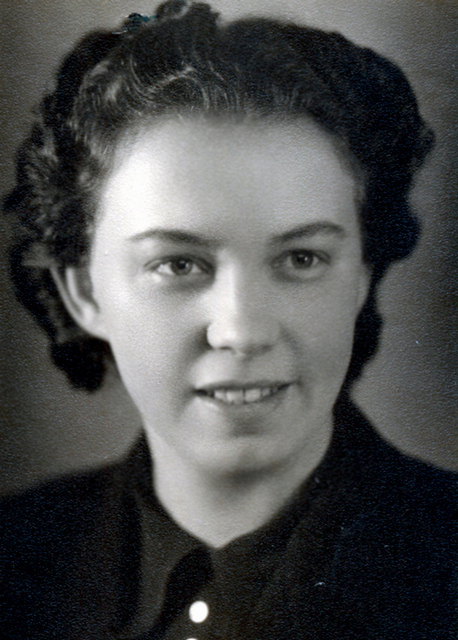Berta Lauscher, née Grubhofer
born 16.01.1913 (Warnsdorf); died 24.02.1984 (Vienna) Postal worker
Ravensbrück: June 1943 – 28. April 1945

Berta Lauscher, Foto aus den frühen 1940er Jahren, Privatarchiv Lauscher
Berta (Sternderl) Lauscher was born in Warnsdorf (today: Czech Republic) on January 16, 1913. After eight years of school, she had to help support the family already, being just 14 years old.
In a textile factory, she became the shop steward of the busy young workers. A strike for wage increases was her entry into political work. Through her father, who was the district leader of the Austrian Communist Party (CPA) in Vienna, 14th district, she found the Communist Youth Association in 1930.
She held various functions in the Youth association. In 1933 she joined the CPA. She was arrested for the first time in 1934 because of her political work with young people, but this did not deter her political work.
In 1936 she traveled to the Soviet Union for 10 months to her future husband, Josef (Pepi) Lauscher, who worked there as a representative of the Austrian Youth Association (K.J.V.) at the Communist Youth International (K.J.I.). When she returned to Vienna in November 1936, she and Hilde Graf together took over the girl work of the K.J.V. in Vienna.
In January 1938, she was arrested along with her brother, sister-in-law, father and Josef Lauscher. They were all released shortly in the course of the February 1938 general amnesty for political prisoners.
After the annexation of Austria by Nazi Germany in March 1938, she was responsible for the escape of some members of the CPA over the border. She was therefore arrested by the Gestapo and sentenced to three months of police punishment.
Subsequently, she was involved in various conspiratorial actions; she took over and distributed leaflets, raised donations for comrades in need and supported arrested members of resistance groups. An illegal transmitter station was to be set up in Upper Austria, and Berta Lauscher took care of the transmitter.
On March 30, 1943, she was arrested by the Gestapo. After three months in solitary confinement, she was deported to Ravensbrück. In 1944 she became a member of the CPA's illegal party leadership.
On April 28, 1945, she and several female comrades (Irma Trksak, Toni Bruha etc) was able to flee from the death march, which was led by the SS and in which all prisoners able to walk were driven onwards. The existing chaos in this march and the nearing Red Army prevented the pursuit of these women by the SS, who themselves were thinking of fleeing and partly wore civil clothes. Nevertheless, the escape remained life-threatening. The war was not yet over and the fugitives were never sure whom they were dealing with. Hunger was their steady companion, so that they once scraped moss and bark from the trees to have something in their stomachs. On this 700 kilometer long trek, cities were avoided as far as possible, due to the danger of falling into the hands of the Gestapo or the police. The fugitives had no papers with them to enable their identification. Short distances were covered in horse-drawn carts or on trucks. Haystacks, abandoned homesteads, bombed-out buildings served as overnight camps. Finally, Berta Grubhofer and her female comrades reached liberated Vienna at the Middle of May 1945, where she was able to embrace her husband, Josef Lauscher, from whom she had been separated for seven years.
Berta Lauscher continued her political work. She was involved in the Concentration camp Association and in the Austrian camp community Ravensbrück. She was significantly involved in the design and implementation of the -> Austrian memorial room in the former bunker in the Ravensbrück Memorial Site. From 1958 to 1971 she was active in the extended committee of the Austrian camp community, from 1977 until her death on February 24, 1984 she held the important position of secretary of the camp community.
Source: written by Berta Lauscher, published in "Mitteilungsblatt der Österreichischen Lagergemeinschaft 2018" (http://www.ravensbrueck.at/projekte-aktivitaeten-2/das-mitteilungsblatt/)* complement by her sun Ernst Josef Lauscher, February 2021